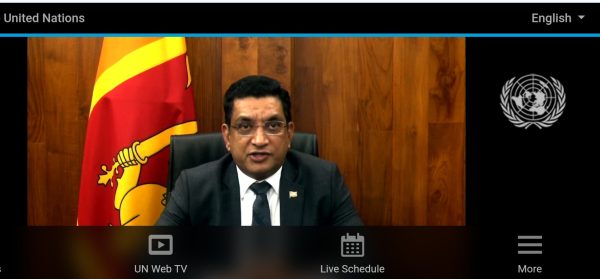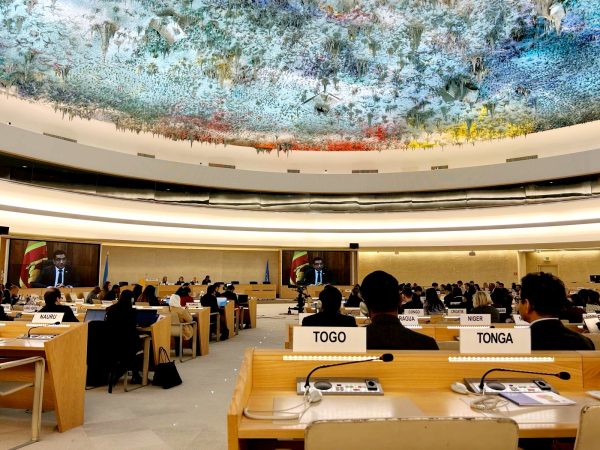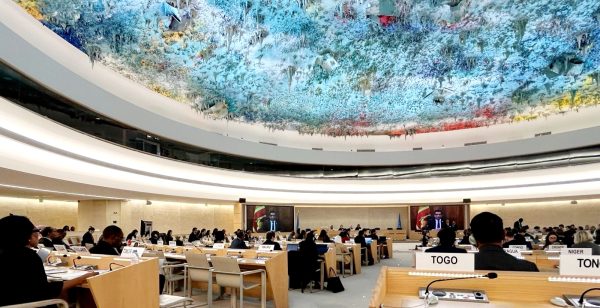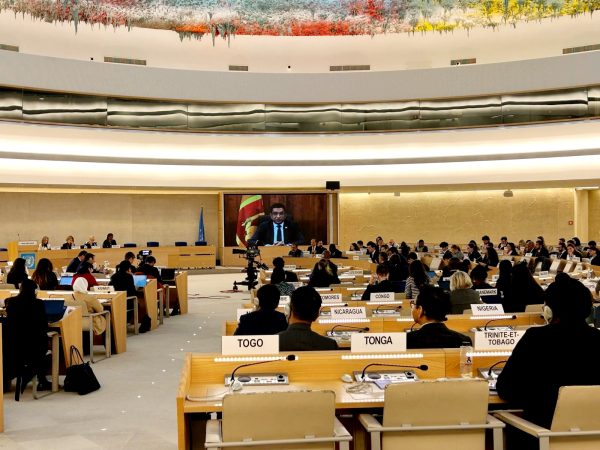
Minister of Foreign Affairs, Ali Sabry urged the members of the UN Human Rights Council not to allow short-term political gains or “domestic vote bank politics” to overtake the work of the Council, when addressing the High-Level segment of the 55th Session of the Council through a pre-recorded video statement on 27 February 2024.
Minister Sabry highlighted that despite the severe constraints faced by the country, Sri Lanka continued to engage actively and constructively with an extensive array of helpful working methods of the Council, that are productive and beneficial to the people.
The Foreign Minister reiterated Sri Lanka's rejection of the HRC resolutions 46/1 and 51/1 and the external evidence gathering mechanism established by these resolutions, while emphasizing that such mechanisms are counterproductive and unhelpful and contradict the founding principles of the Council.
He also provided an overview of the tangible progress made by the country with regard to economic recovery, national unity and reconciliation and added that the cornerstone of this recovery lies in pragmatic policy decisions that prioritize the country’s welfare over short-term political gains. The significant progress achieved in this regard has been recognized and welcomed both locally and internationally, he stated.
While stating that the Council’s approach to the humanitarian crisis in Gaza will be another litmus test to its credibility, Minister Sabry urged the Council to prioritize depoliticization, constructive dialogue, and multilateral cooperation while avoiding double standards.
The 55th Session of the Council takes place in Geneva from 26 February – 5 April 2024. During this Session, the UN High Commissioner for Human Rights will present an oral update on Sri Lanka on 04 March 2024, as mandated by the HRC Resolution 51/1. Sri Lanka’s Permanent Representative to the UN in Geneva Himalee Arunatilaka will deliver Sri Lanka’s statement as the country concerned following the oral update by the High Commissioner.
Ministry of Foreign Affairs
Colombo
28 February 2024



........................................................
Address by Hon. Ali Sabry, Minister of Foreign Affairs of Sri Lanka
55th Regular Session of the Human Rights Council
High-level segment
Mr. President,
Excellencies,
Distinguished delegates,
Ladies and gentlemen,
Let me begin, Mr. President, by congratulating you on your election as the President of the Council. I assure you of my delegation’s full cooperation in discharging your duties.
Sri Lanka has over the years, engaged actively and constructively with the UN Human Rights Council, to enhance the multilateral framework for the promotion and protection of human rights.
Despite the severe constraints we faced, particularly in the recent past, we have continued to maintain such engagement with an extensive array of the helpful working methods of this Council that we believe are productive and beneficial to our people. Our recent engagements, including the UPR Review under the 4th Cycle in February 2023 and the ICCPR Review in March 2023, reflect our commitment to constructive dialogue on human rights and reconciliation.
We have taken note of the constructive comments and recommendations made during these Reviews. After careful consideration of all 294 recommendations received at the 4th Cycle of the UPR, the Government of Sri Lanka supported 173, while 115 were noted, 06 recommendations which referred to HRC resolutions 30/1, 46/1 and 51/1 were rejected by Sri Lanka, based on our position on these resolutions, that has been reiterated many times at this Council. Sri Lanka also announced 12 voluntary pledges. In addition, earlier this month, the inaugural session of an Inter-Ministerial Standing Committee on Human Rights was established with the approval of the Cabinet of Ministers, as a national framework to ensure efficient coordination and reporting on Sri Lanka’s voluntary international commitments regarding human rights and reconciliation.
It is in this spirit of constructive and open engagement that I address the current session of the Council.
Mr. President,
It is pertinent to me to state that in overcoming the challenges of the recent past, the people and the Government have ensured that the political transition which ended the widespread social protests of 2022, took place within the democratic, institutional and constitutional framework of the country. As the international community is aware, over the past year, while economic recovery was a foremost priority to Sri Lanka, the Government continued to take tangible steps in the interest of national unity and reconciliation as key priorities. We are acutely aware of the challenges that lie ahead and the socio-economic hardships that the people continue to face. The Government remains committed to protecting vulnerable segments of the society, including through targeted social protection measures and subsidies.
The cornerstone of this recovery lies in pragmatic policy decisions that prioritize the country’s welfare and national reconciliation and unity over short-term political gains. These are not easy decisions but are essential for the country’s overall progress. The significant progress achieved in this regard has been recognised and welcomed both locally and internationally.
Mr. President,
Sri Lanka has long placed high importance to national unity and reconciliation. In such context, President Ranil Wickremasinghe has outlined his vision for the way forward, on reconciliation efforts and rapid development plans for the North and the Eastern Provinces. We are regularly reviewing the progress on implementation of this vision, at the highest administrative levels, particularly in relation to the work of Sri Lanka’s domestic mechanisms: the Interim-Secretariat for the Truth and Reconciliation Commission, the Office of Missing Persons (OMP), the Office for Reparations (OR) and the Office for National Unity and Reconciliation (ONUR).
Despite the economic constraints of the recent past, these institutions have been strengthened and the tangible progress made is visible. Work is also progressing on a wide range of issues, including, inter-alia on reaching out to overseas Sri Lankans, resettlement, release of lands and the remaining IDPs in the Northern Province.
I take this opportunity to reaffirm Sri Lanka’s commitment to engaging in constructive human rights processes while rejecting politicized and unilateral measures that infringe upon the sovereignty of Member States.
Sri Lanka reiterates its categoric rejection of the external evidence gathering mechanism, established following Resolutions 46/1 and 51/1, which will have wide-ranging legal and political implications for all countries, contradicting the founding principles of the Council. This ever-expanding mechanism will be an unproductive and unhelpful drain on the resources of the Council and its Members.
I urge the members of this Council not to allow short-term political gains or as it is now being termed as “domestic vote bank politics” to overtake the important work of this Council. The Council is already traversing the same path as its predecessor, the Commission on Human Rights with disproportionate scrutiny and focus on countries of the Global South. With a host of selective country specific mandates and intrusive mechanisms, the Council, established to safeguard and protect the human rights of all, continues to become increasingly politicized and divisive. We encourage dialogue and constructive cooperation rather than political confrontation, which I am sure, will better serve us to re-build the trust that the world needs.
Mr. President,
It would be a remiss of me, if I do not refer to existential threat to the people in Gaza. How the Council approaches the humanitarian crisis in Gaza will be another litmus test to its credibility as the foremost international human rights body. It is crucial and timely for this Council to reclaim its original mandate by prioritizing depoliticization, embracing constructive dialogue and multilateral cooperation. Only by doing so can we uphold the integrity of the international human rights framework and effectively address the dire humanitarian situations such as the one in Gaza. We reiterate the importance of avoiding double standards being practiced at this Council. The suffering of innocent civilians must not be overlooked in the pursuit of political agendas, and urgent action is needed to alleviate their plight.
Thank you.




